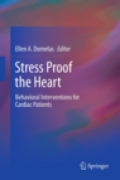
Stress proof the heart: behavioral interventions for cardiac patients
Dornelas, Ellen A.
Cardiovascular disease is a leading cause of death throughout the world. Chronic negative emotions such as depression and anxiety place cardiac patients atgreater risk for death and recurrence of cardiovascular disease. In 2008 the editor published a book related to this topic, titled Psychotherapy with Cardiac Patients: Behavioral Cardiology in Practice (American Psychological Association). Aside from that book, there are very few resources specifically writtenfor clinicians who treat psychologically distressed cardiac patients. Unlike other medical specialty areas such as oncology, the field of cardiology has been slow to integrate behavioral treatments into the delivery of service. Perhaps because the field has been largely defined and dominated by researchers, mental health clinicians are only starting to recognize behavioral cardiology asa viable arena in which to practice. There is a large void in the practitioner literature on behavioral cardiology. In a review of Psychotherapy with Cardiac Patients, Paul Efthim, Ph.D. wrote, 'Her new book goes well beyond previousworks by giving specific and detailed guidance about how to tailor psychological interventions with this variegated population.' He added, 'It would benefit from even more details about treatment approaches.' This proposed volume goes beyond the editor’s previous volume by providing in-depth descriptions of behavioral treatments for distressed cardiac patients written by eminent leadersin behavioral cardiology. This book describes a wide range of behavioral treatments for the common psychologically based problems encountered by clinicianswho treat cardiac patients. The book is organized as follows: Part I focuses on the most psychologically challenging and common presentations of cardiac diagnosis; coronary artery disease, arrhythmia, and heart failure. This section also includes a chapter on heart transplantation, which is a treatment, not a diagnosis, but a treatment that incurs profound psychological impact for the individual. In Part II, behavioral interventions for the general cardiac population are described. Mainstream therapies such as stress management, cognitive-behavioral therapy, and medical family therapy are described, along with approaches that have less empirical support but considerable practical significancesuch as personality-guided therapy and interventions aimed at altering type Dpersonality traits. The literature in behavioral cardiology has a rich history of investigating maladaptive personality traits and thus it is important to include behavioral approaches that target personality in this volume. Part IIIfocuses on common behavioral problems encountered by clinicians who work withthis patient population. Most patients who seek psychological help do so because they perceive themselves to be stressed due to their job or overextended in all areas of their life. Other people with heart disease present with sleep problems and/or an inability to moti This book provides in-depth descriptions of behavioral treatments for distressed cardiac patients. Contributors are drawn from internationally eminent leaders in behavioral cardiology. Focuses on how to integrate behavioral treatments into a comprehensive treatment model. INDICE: Part I. Psychological Challenges of Heart Disease. 1. Introduction. 2. Psychological Challenges of Coping with Coronary Artery Disease. 3. Sudden cardiac arrest: a biopsychosocial approach to patient management of ventricular fibrillation and implantable cardioverter defibrillators. 4. Atrial Fibrillation: A Biopsychosocial Approach to Patient Management. 5. Psychological Management of the Patient with Heart Failure. 6. Psychiatric symptoms, personality profile and Takotsubo syndrome: Clinical considerations. 7. Psychological Aspects of Cardiac Transplantation. Part II. Psychological Interventions for Cardiac Patients. 8. Anxiety and depression: Risk Factors for Cardiovascular Disease. 9. Interventions in the Context of the Distressed (Type D) Personality.10. Stress Management with Cardiac Patients. 11. The Effects of Meditation and Yoga on Cardiovascular Disease. 12. Job Stress and Overcommittment in Cardiac Patients. 13. Managing Sleep Problems Among Cardiac Patients. 14. Exercise as Medicine for Cardiac Patients. 15. Approaches to Smoking Cessation in a Cardiovascular Population. Advances in Cardiac Psychology: Computerized Therapies.Behavioral Cardiology: Toward the Development of Integrated Treatment Models.
- ISBN: 978-1-4419-5649-1
- Editorial: Springer New York
- Encuadernacion: Cartoné
- Páginas: 426
- Fecha Publicación: 28/03/2012
- Nº Volúmenes: 1
- Idioma: Inglés
